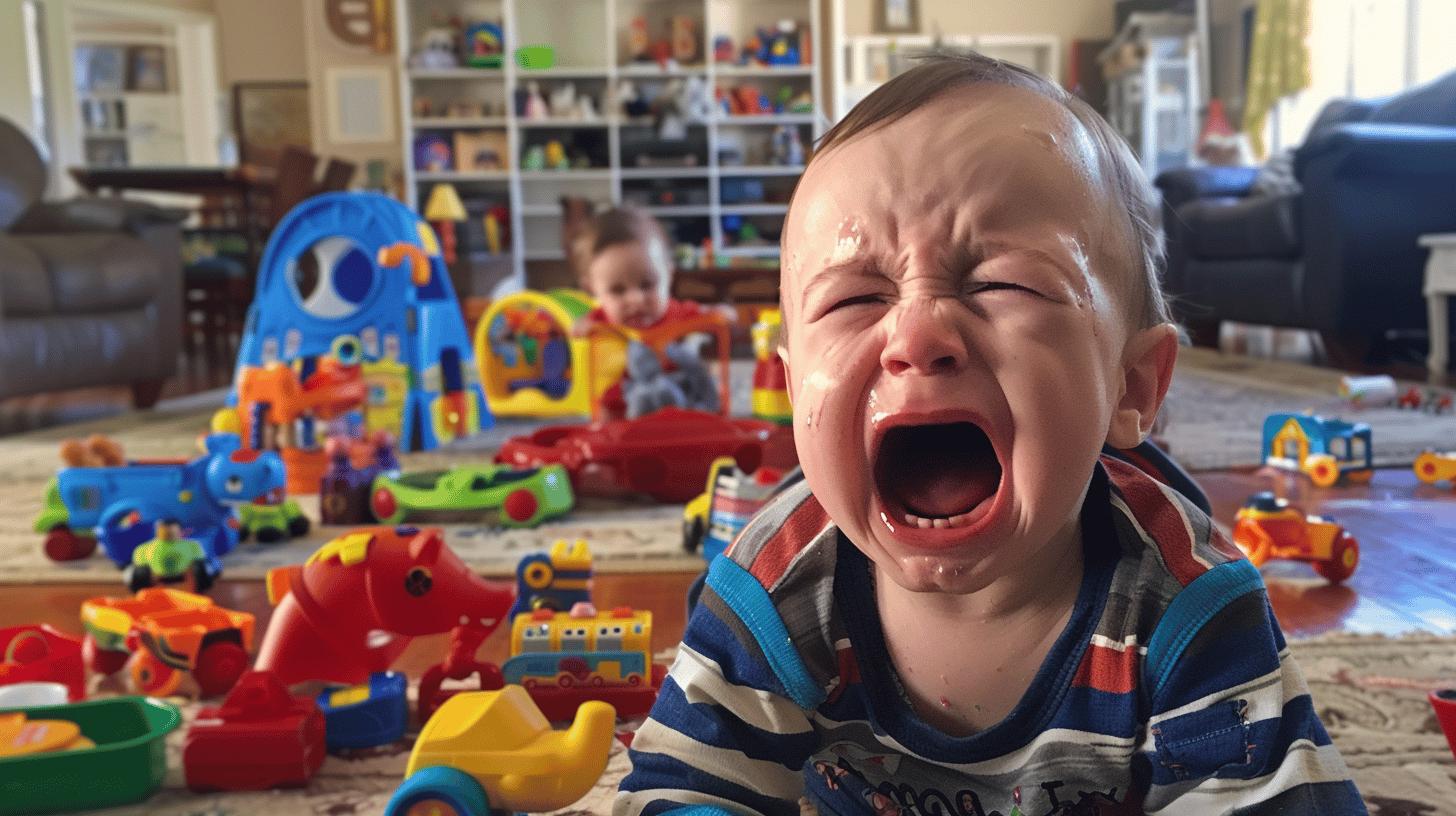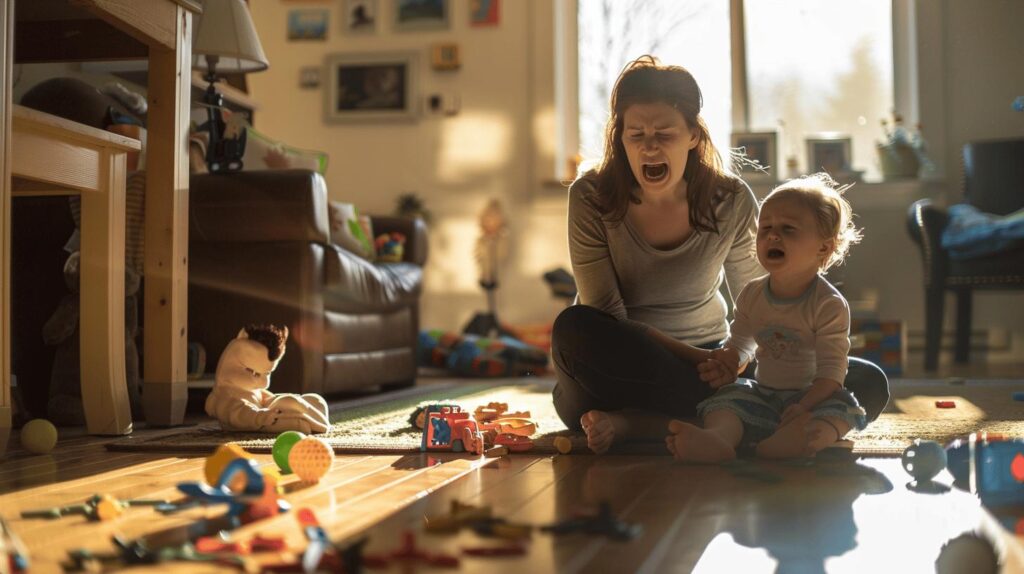Ever felt like you're always playing catch-up with your child’s behavior? Reactive parenting might be the issue. Reacting with uncontrolled emotional outbursts, like yelling or punishing without explanation, is common among parents feeling overwhelmed or frustrated. These impulsive responses can damage your relationship with your child, leading to feelings of shame and regret for you, and misunderstanding or resentment from them. In this article, you'll learn to identify these reactive behaviors and discover practical steps to manage them for a healthier parent-child connection.
Understanding Reactive Parenting
Reactive parenting involves responding to children with uncontrolled emotional outbursts, often stemming from frustration. It is characterized by impulsive, inconsistent, and punitive reactions driven by strong emotions in response to a child's behavior, such as yelling or punishment. Why does reactive parenting happen? It often occurs when parents are overwhelmed or stressed, lacking the emotional resources to respond thoughtfully. This can result from factors such as fatigue, external stressors, or unmet personal needs.
The implications of reactive parenting are significant for both parents and children. For parents, frequent reactive responses can lead to feelings of shame, guilt, or failure, creating a cycle of negative emotions. Children, on the other hand, may experience resentment, misunderstanding, or fear, which can damage the parent-child relationship and hinder emotional development. The inconsistency and emotional volatility of reactive parenting can leave children feeling insecure and confused about what to expect from their parents.
Common emotional triggers leading to reactive parenting behaviors include stress, fatigue, and unmet expectations. For example, a parent who is exhausted from a long day at work may react impulsively when their child misbehaves. Similarly, unrealistic expectations about a child's behavior can lead to frustration and reactive responses. Understanding these triggers can help parents develop strategies to manage their emotions and respond more calmly.
Typical signs of reactive parenting:
- Yelling or screaming at children.
- Punishing without explanation.
- Inconsistent discipline.
- Impulsive reactions.
- Regret or guilt after reacting.
Examples of Reactive Parenting

Reactive parenting often manifests in everyday situations where parents respond impulsively to their children's behavior. Common examples include yelling when a child disobeys, punishing without providing a clear explanation, or enforcing inconsistent rules. These reactions are usually driven by immediate emotions rather than thoughtful responses, making it difficult for children to understand the reasons behind their parents' actions.
Such behaviors can significantly impact the parent-child relationship and the child's development. For instance, a child who is frequently yelled at may develop anxiety or fear, potentially leading to strained communication and trust issues. Inconsistent discipline can leave children feeling confused about boundaries and expectations, hindering their ability to develop self-discipline and emotional regulation. Over time, these patterns can contribute to long-term behavioral and emotional challenges for the child.
| Example | Description |
|---|---|
| Yelling or screaming | Reacting with loud, harsh words when a child misbehaves. |
| Punishing without explanation | Administering consequences without explaining the reason behind them. |
| Inconsistent discipline | Changing rules or consequences based on the parent’s mood. |
The Effects of Reactive Parenting on Children
Reactive parenting can have a profound negative impact on a child's psychological and emotional well-being. Children subjected to frequent reactive outbursts from parents often experience heightened anxiety. The inconsistency and unpredictability of reactive parenting can leave children feeling insecure and constantly on edge, unsure of what to expect. This environment of uncertainty can lead to increased stress and anxiety levels, affecting their overall mental health.
In addition to emotional distress, reactive parenting can significantly influence a child's behavior and academic performance. When parents react impulsively or punitively, children may struggle with poor emotional regulation. They might imitate these behaviors, leading to increased aggression or behavioral issues in school and social settings. Furthermore, the lack of clear communication and consistent discipline from parents can hinder a child's ability to focus and perform well academically. The stress and confusion stemming from reactive parenting can distract children from their studies, resulting in lower academic achievement.
The long-term consequences of reactive parenting can be far-reaching, potentially affecting a child's developmental trajectory. Reduced trust in parents is a critical issue; children who frequently face reactive responses may feel alienated and less likely to confide in their parents. This erosion of trust can strain the parent-child relationship, making it difficult to foster a supportive and nurturing environment. Additionally, children may develop lower self-esteem and struggle with poor emotional regulation, further complicating their social interactions and personal growth. Over time, these developmental issues can contribute to ongoing challenges in forming healthy relationships and achieving personal success.
-
Specific effects on children:
- Increased anxiety.
- Reduced trust in parents.
- Poor emotional regulation.
- Lower self-esteem.
- Behavioral issues.
- Academic difficulties.
- Strained parent-child relationship.
Reactive Parenting vs. Responsive Parenting

Reactive parenting is characterized by impulsive, emotion-driven responses to a child's behavior. Parents often react immediately based on their own frustrations or anger, without considering the child's underlying needs or feelings. This can lead to inconsistent discipline, punitive measures, and actions that can damage the parent-child relationship. In contrast, responsive parenting involves understanding a child's needs and responding thoughtfully and consistently. Instead of reacting impulsively, parents take the time to assess the situation, consider the child's perspective, and respond in a way that fosters positive emotional development and secure attachments.
The benefits of responsive parenting are numerous for both parents and children. For parents, adopting a responsive approach can reduce the stress and guilt associated with reactive outbursts. It allows them to build a more positive and supportive relationship with their child, leading to better communication and trust. For children, responsive parenting promotes emotional regulation, higher self-esteem, and secure attachments. Children feel understood and valued, which can enhance their overall emotional well-being and development. They learn to manage their emotions better and develop healthier social interactions.
Shifting from reactive to responsive parenting requires mindfulness and intentionality. Parents need to recognize their emotional triggers and develop strategies to manage their responses. This might involve taking a pause before reacting, practicing deep breathing, or reflecting on the child's needs before deciding on a course of action. By focusing on long-term parenting goals rather than immediate reactions, parents can foster a more nurturing and supportive environment for their children. This shift not only benefits the child but also enhances the overall family dynamic, leading to more harmonious and fulfilling relationships.
- Key differences between reactive and responsive parenting:
- Impulsiveness vs. Thoughtful responses.
- Emotion-driven vs. Needs-driven.
- Inconsistent discipline vs. Consistent discipline.
- Immediate reactions vs. Paused responses.
- Punitive measures vs. Teaching and guidance.
Strategies to Stop Reactive Parenting
Self-care and emotional regulation are crucial for parents to manage their reactions effectively. When parents are well-rested and emotionally balanced, they are less likely to react impulsively. Practicing self-care includes getting enough sleep, engaging in activities that bring joy, and seeking emotional support when needed. By prioritizing their well-being, parents can better handle stress and respond more thoughtfully to their children's behavior.
Setting clear boundaries and consistent rules can also prevent reactive parenting. When children know what to expect, they are less likely to push limits, reducing the chances of triggering a reactive response from parents. Clearly defined rules and consistent enforcement help children understand acceptable behavior, creating a more stable environment. Consistency in discipline also reinforces positive behavior, making it easier for parents to respond calmly.
Techniques like mindful breathing and counting to manage emotional responses can be highly effective. When faced with a challenging situation, taking a few deep breaths or counting to 10 (or even 50) can provide a moment to pause and collect thoughts. This brief pause allows parents to assess the situation more objectively and choose a more appropriate response. These techniques can help break the cycle of immediate, emotion-driven reactions and encourage more deliberate actions.
Understanding and addressing children's triggers and needs is essential for reducing reactive parenting. By paying attention to what provokes certain behaviors in children, parents can develop strategies to address those triggers proactively. Engaging in empathetic listening helps parents understand their children's perspectives and respond with compassion. This approach not only reduces the likelihood of reactive outbursts but also strengthens the parent-child relationship by fostering trust and open communication.
-
Actionable strategies to stop reactive parenting:
- Practice self-care and ensure adequate rest.
- Set clear boundaries and consistent rules.
- Use mindful breathing and counting techniques.
- Engage in empathetic listening with children.
- Reflect on and understand personal triggers.
- Seek support from parenting groups or professionals.
- Focus on long-term parenting goals rather than immediate reactions.
Case Studies: Overcoming Reactive Parenting

Case Study: Andrew
Andrew found himself frequently reacting harshly to his children's behavior, leading to feelings of regret and guilt. He realized that his impulsive responses were damaging his relationship with his kids. Determined to change, Andrew began by identifying his emotional triggers, such as stress from work and lack of sleep. He implemented a strategy of taking a deep breath and counting to ten before responding to his children's actions. This pause allowed him to assess the situation more calmly and choose a more thoughtful response. Over time, Andrew noticed a significant improvement in his interactions with his children, fostering a more positive and supportive family environment.
Case Study: Lindsay
Lindsay often felt overwhelmed by her daughter's challenging behavior, leading to frequent reactive outbursts. Recognizing the negative impact on her daughter, Lindsay decided to adopt a more mindful approach to parenting. She started by setting clear expectations and consistent rules, reducing the uncertainty that often triggered her frustration. Additionally, Lindsay practiced empathetic listening, making an effort to understand her daughter's perspective and underlying needs. By focusing on long-term parenting goals and seeking support from a parenting group, Lindsay successfully transformed her reactive habits. Her daughter responded positively to the changes, resulting in a stronger and more trusting relationship.
Final Words
In the action, readers explored the nuances of reactive parenting, identified its signs, and saw its negative impacts on children. Real-life examples illustrated how reactive behaviors manifest in daily life and their consequences.
The discussion also highlighted the benefits of responsive parenting and provided actionable strategies to make the switch.
Understanding reactive parenting is the first step towards change. Adopting a proactive approach can greatly benefit both parents and children. Embrace more mindful responses for healthier parent-child relationships.
FAQ
What are reactive parents?
Reactive parents are those who respond to children's behaviors with uncontrolled emotional outbursts, such as yelling or punishment. These reactions are often driven by frustration and strong emotions.
How to fix reactive parenting?
To fix reactive parenting, practice self-care, set clear rules, use mindful techniques, engage in empathetic listening, understand personal triggers, and seek support from parenting groups or professionals.
What is the difference between reactive and proactive parenting?
Reactive parenting involves impulsive responses driven by emotions, while proactive parenting focuses on planning and thoughtful responses to children's needs.
What is the opposite of reactive parenting?
The opposite of reactive parenting is responsive parenting. Responsive parenting involves understanding a child's needs and responding thoughtfully and consistently.
What are some examples of reactive parenting?
Examples of reactive parenting include impulsive yelling, punishing without explanation, and inconsistent discipline.
What are the typical signs of reactive parenting?
Typical signs of reactive parenting include:
- Yelling or screaming at children
- Punishing without explanation
- Inconsistent discipline
- Impulsive reactions
- Regret or guilt after reacting
What are the effects of reactive parenting on children?
Reactive parenting can increase a child's anxiety, reduce trust in parents, hinder emotional regulation, lower self-esteem, lead to behavioral issues, cause academic difficulties, and strain the parent-child relationship.
How does responsive parenting differ from reactive parenting?
Responsive parenting is characterized by thoughtful, needs-driven responses, consistent discipline, and teaching and guidance, while reactive parenting is impulsive, emotion-driven, and usually involves punitive measures.


